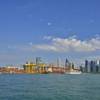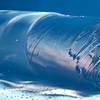The vessels which will take part in the CLINSH project (CLean INland SHipping) have been selected. Their emissions will be closely monitored during the two-year project, part of the European Union’s LIFE programme.
The vessels are to test various emissions-reducing technologies including the use of alternative fuels. The data gathered will provide valuable information about their environmental performance and the operating costs. The overall purpose of the CLINSH project is to create a fully sustainable inland shipping sector, which entails reducing emissions of hazardous substances such as nitrogen oxides and fine particulates
The selected barge operators were presented at a launch meeting hosted by the Port of Antwerp on 27 October.
European tender
The vessels taking part in the project were selected by means of a European tender. They fall into two groups: vessels which are to be fitted with an emissions control system for the purposes of the project. The technologies to be tested include SCR-DPF (Selective Catalytic Reduction in combination with a Diesel Particulate Filter), Fuel Water Emulsion technology and hybrid power installations. Some vessels will be adapted to run on an alternative fuel such as Liquefied Natural Gas or Gas to Liquid Fuel. And vessels in which such measures have already been applied.
The practical trials will commence in early 2018 once all the necessary modifications have been made. Data collected during regular operations will provide useful information for the sector itself and for public sector authorities at all levels: local, regional, national and international.
The knowledge gained will support new policy intended to reduce harmful emissions. CLINSH will also reveal the economic implications for owners and operators, presenting the business case for sustainability measures.
Participation in CLINSH will provide owners and operators with new knowledge about the various technologies available and the environmental benefits they offer. Improved environmental performance is likely to increase an operator’s market appeal and help to attract new customers.
Several large companies have already decided to award contracts to operators who are able to demonstrate their environmental responsibility. Investment in emissions control systems is therefore an investment in long-term business continuity. Moreover, project participants become eligible for a grant towards the cost of modifications which are likely to become mandatory in future. They are acting as pioneers within the sector.
Rik Janssen is a member of the Provincial Executive of Zuid-Holland, which is the lead partner in the CLINSH project. “To remain competitive, the sector must invest in cleaner vessels,” he states. “We need people to lead the way, and we have found them in the operators taking part in the practical trials. The knowledge they develop will allow us to make an important contribution to a cleaner living environment"
Marc Van Peel, President of the Antwerp Port Authority, adds: “The inland shipping sector carries cargo to and from all parts of the European hinterland and is therefore crucial to the maritime ports. Like all other transport modalities, it must reduce harmful emissions. By taking part in this project, Port of Antwerp wishes to accelerate sustainable transition in close cooperation with the inland shipping.”











